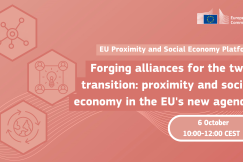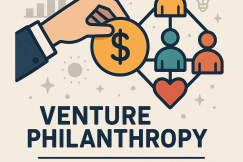Articles
13 October 2025
Social Economy European Summit 2025 – Conference: Implementing the SEAP
Articles
13 October 2025
Financing the ecosystem
Partnerships
Regenerative Green Transition
+68 more
-
23
To mark Social Economy Week – 16–18 September 2025, SEE co-organised the Social Economy European Summit in Murcia – the 2025 Spanish capital of the social economy. The Summit gathered more than 650 participants, 100 international speakers, 200 organisations and government delegations from 27 European and Southern Mediterranean countries, together with high-level EU and national authorities.
Topics
Albania
Armenia
Austria
Belgium
Bosnia and Herzegovina
Bulgaria
Croatia
Cyprus
Czechia
Denmark
Estonia
EU-27
Finland
France
Georgia
Germany
Greece
Hungary
Iceland
Ireland
Italy
Kosovo
Latvia
Liechtenstein
Lithuania
Luxembourg
Malta
Moldova
Montenegro
Netherlands
North Macedonia
Norway
Poland
Portugal
Romania
Serbia
Slovakia
Slovenia
Spain
Sweden
Switzerland
Türkiye
Ukraine
Other
Academic / Research and VET Institutions
Business Support Organisation
Company with 250 or more employees
Cluster Organisations
Consumer Organisations
Cultural and Heritage Organisations
Destination Management & Marketing Organisations
EU Institutions
Financial Institutions and Investors
Industry Associations and Chambers of Commerce
International Organisations
Local Authorities
Media / Journalist Organisations
National authorities
Networks and Federations / Confederations
NGOs / Non-profits
Notified Bodies
Regional Authorities
SMEs (a company with less than 250 employees)
Social Economy Entity
Trade Unions
Other
-
Thematic area
-
-
Financing the ecosystem
-
Partnerships
-
Regenerative Green Transition
-
Skills
-
Transformative Digital Transition
-
Urban and Rural Wellbeing
-
Working conditions and governance
-
-
Interlinkages with other sectors
-
-
Proximity and social economy
-
Agri-food
-
Construction
-
Cultural and creative industries
-
Digital
-
Electronics
-
Energy intensive industries
-
Energy-renewables
-
Health
-
Mobility, transport, automotive
-
Retail
-
Textile
-
Tourism
-
Aerospace and defence
-
-
Action areas and keywords
-
-
15-minute city
-
Access to Finance
-
Access to technology
-
Addressing capacity and skills gap
-
Advancing gender equality and safety at work
-
Blue Economy
-
Boosting digital skills by - and in the social economy
-
Buy social
-
Certification, labelling and self-regulation
-
Circular Economy
-
Clusters (including Cluster of social and ecological innovation)
-
Corporate social responsibility (CSR)
-
Creating financial incentives and supportive regulation for green and circular social economy business models
-
Data Maturity and data driven business models
-
Data sharing, Data management & Code of Conduct
-
Digital Platforms
-
Digital social innovation
-
Economic democracy
-
Education
-
Future workplaces
-
Greening infrastructures and business operations
-
Housing
-
ICP rights & workers involvement
-
Industrial relation and social dialogue
-
Innovation
-
Innovation as enabler for green transition and business development in the social economy
-
Internationalisation
-
Local employment
-
Local Green Deals, green business communities and citizens’ initiatives
-
Local Markets
-
Micro mobility
-
New business models
-
New business models – the platform economy
-
New European Bauhaus
-
Other action area
-
Public and private tech partnerships and support
-
Reinforcing Business to Business collaboration for greener and circular value chains
-
Responsible (Public) Procurement
-
Smart mobility
-
Social Finance
-
Socially oriented territorial regeneration
-
Strategy for Data
-
Supporting Digital Social Innovation & Tech for Good entrepreneurship
-
Sustainable Finance
-
Tech for Good
-
-
Ecosystem focus
-
-
Social economy
-
-
Scope of activity
-
-
International
-
Local/neighbourhood
-
National
-
Regional
-
Share
The week’s signature event was the high-level conference, ‘Implementing the Social Economy Action Plan (SEAP),’ held on Wednesday 17 September at the Víctor Villegas Auditorium and Congress Centre. It brought together key actors from across the social economy ecosystem to assess the implementation of the SEAP and explore future policy directions. The programme focused on taking stock of the EU’s Social Economy Action Plan (SEAP) and moving from commitments to delivery: speakers from EU institutions, Member States, and regional and local authorities compared lessons from national and regional strategies, discussed funding and enabling frameworks, and highlighted how the Council Recommendation on developing social-economy framework conditions is being implemented across Europe. The event positioned SEAP’s mid-term phase as an opportunity to tighten framework conditions, improve access to finance and capacity-building, and raise the visibility and recognition of social-economy actors ahead of the 2030 horizon. High-level speakers participated in the conference: Yolanda Díaz, Second Vice-President and Minister of Labour and Social Economy of Spain explained that “The social economy is fundamental to the European project. We need more social Europe than ever.” and Roxana Mînzatu, Executive Vice-President for Social Rights and Skills, Quality Jobs and Preparedness of the European Commission affirmed that “SE is rooted in local communities—close to citizens’ hearts. I am your partner. Let’s work intensively in the year ahead to boost the sector. The social economy brings a model of political resilience, to reconnect citizens with politicians, with political directions and the EU as a whole.”, amongst many others. SEE President Juan Antonio Pedreño called for the full implementation of all measures set out in the Action Plan and the 2023 Council Recommendation in all Member States in order to guarantee stable legal and financial frameworks, with ambitious budget lines in all countries. He stressed the need to keep the social economy at the core of the EU’s industrial policy and to embed it in the European Semester so it helps shape major socio-economic decisions and continued investment in capacity building for social economy entrepreneurs and the promotion of collective entrepreneurship, alongside stronger legal and political recognition for all strands of the social economy—especially in strategic fields such as housing, energy, care, food, and social and technological innovation. He also made 4 recommendations to the next MFF: Firstly, SEE calls for robust and independent FSE+ and ERDF. Secondly, it calls for the explicit inclusion of the social economy (SE) as a priority in the Financial Framework architecture and the National Reform Programmes. Furthermore, the funding architecture of the next MFF must recognise the social economy as a key actor, with its various strands made accessible to social economy actors. Lastly, the InvestEU programme must be strengthened; in particular, the social investment and skills window should be made more transparent and accessible to social economy actors, by offering tailored financing. He thanked attendees for their commitment to building not just the future of the social economy, but Europe’s future, reminding us that “Alone we are invisible but together we are invincible” Check here the full article |
Comments (0)
See also
Forging alliances for the twin transition: proximity and social economy in the EU's new agenda: second annual event
- Categories
- Partnerships Regenerative Green Transition Skills +68 more
From Pathway to Practice: a closing note from the EU PSE Platform editorial team
- Categories
- Partnerships Regenerative Green Transition Skills +68 more
The evolution of philanthropy: from traditional giving to Venture Philanthropy and Impact-Driven Investment
- Categories
- Partnerships Regenerative Green Transition Skills +68 more




